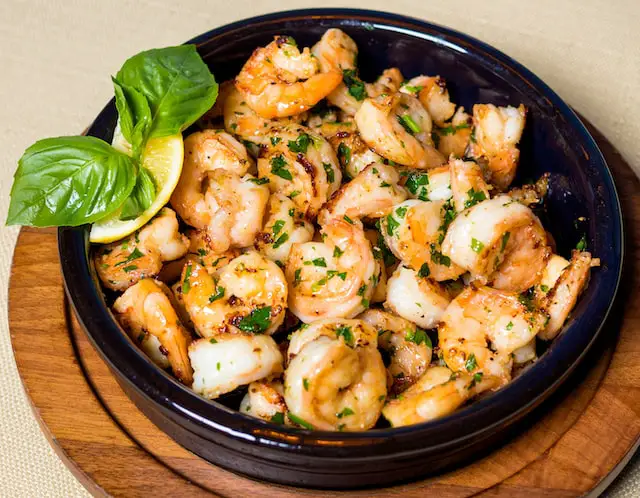Shrimp is a delicacy enjoyed all over the world for its delicious taste. It is readily available either fresh from the oceans or frozen. It can also be prepared in many different recipes, making it the perfect dish for a quick dinner as well as an elaborate lunch with guests.
Additionally, as seafood, shrimp has a hoard of health benefits needed for the proper growth and function of your body.
Health nutritionists recommend taking shrimp often to aid in certain nutrients vital for the growth and health of your body.
However, is it advisable to eat shrimp every day?
Shrimp may be a tasty treat that you can eat every day without getting tired of it. However, that doesn’t mean you should. Too much shrimp intake is not suitable for your health, and you should aim to eat a balanced diet to maintain a healthy weight.
If you are looking for ways to add shrimp to your diet without overdoing it, read on to learn more about this popular seafood.
About The Shrimp Delicacy

Fish and other seafood are essential for a healthy balanced diet. Shrimp is considered part of important seafood that is rich in protein and low in saturated fat. Shrimp is therefore encouraged by health experts as a healthy and necessary addition to food intake.
Additionally, shrimp is very tasty and can be eaten in a variety of recipes. Some people prefer their shrimp fresh from the ocean, pan-fried in garlic butter with a side of stir-fried vegetables. Others store batches of frozen shrimp in their freezer for a buttery dish of the delicacy.
Children, pregnant women as well as the elderly can all benefit from nutrients found in shrimp such as copper, which helps with bone growth. However, you prefer to eat your shrimp, the nutritional benefits of this protein-packed food are unmatched.
What Happens If You Eat Shrimp Every Day?

If you love shrimp, you may be wondering, is there anything as too much shrimp? Unfortunately, yes. Like most things, moderation is recommended when eating shrimp to avoid adverse effects.
Some people know right away when they have an allergic reaction to seafood. However, some allergic reactions only manifest once you eat too much of something.
If you eat shrimp every day, it can cause an allergic reaction. To avoid this, keep your weekly intake of shrimp to about 12 ounces total per week.
Additionally, shrimp contains high cholesterol and high purines. Eating too much shrimp can leave you with excess purines in your body. When purines are digested, they produce uric acid.
Uric acid is dangerous because it can cause a buildup of uric acid crystals. These crystals accumulate in the joints and can cause kidney stones and gout.
How Much Shrimp Can You Eat In A Day?
To avoid adverse health problems, it is important to know how much shrimp you can have in a day or a week. Though different ages and lifestyles require varying levels of nutrition, we have listed a general guide for adults, kids, and pregnant women.
How Much Shrimp Per Day For Adults?
If you are not allergic to seafood, you can safely add shrimp to your weekly meal plan for a healthy and balanced diet without overdoing it.
For adults, the recommended intake of shrimp is about two or three servings per week. That’s about 8 to 12 ounces of shrimp.
How Much Shrimp Per Day For Kids?

Shrimp is a great source of protein for kids. Adding shrimp is also a good way to add much-needed nutrients such as selenium, choline, and vitamin B12 into your kid’s diet.
Serve kids according to their age. For toddlers, about one ounce of shrimp is sufficient.
How Often Can A Pregnant Woman Have Shrimp?
Pregnant women require a very well-balanced diet for their baby’s health. Experts agree that it is safe to eat shrimp during pregnancy as it is a healthy source of vital nutrients and has very low levels of mercury.
However, remember but stay within healthy limits. That can be anywhere between two to three servings of shrimp every week. Ensure that the shrimp is thoroughly cooked to avoid food poisoning.
How Often Should You Eat Shrimp A Week?
Shrimp is very versatile and easy to prepare. Because of that, you may find yourself eating it more often than not. To avoid overeating shrimp, there’s a simple guide to know how often you should eat shrimp in a week.
Depending on your age, weight, and lifestyle, the amount of protein intake you should take will vary. According to the Nutrition Source, two average meals a week are more than sufficient to provide you with the required nutrients found in shrimp without the possible adverse effects.
Shrimp is especially a health expert’s favorite because it is low in mercury, meaning that you can eat it more than you would other kinds of seafood, such as white tuna.
Read Also: Should You Eat Shrimp Tails and Shells?
Shrimp Nutritional Profile
Shrimp has a lot more to offer than just high dietary protein and low calories. Here’s a quick table with the nutrients found in shrimp;
| Nutrients | Calories | Protein | Iron | Phosphorus | Potassium | zinc | Sodium |
| Per Serving | 84.2. | 20.4 g | 0.433 mg | 201 mg | 220mg | 1.39mg | 94.4mg |
Some of the nutrients found in shrimp include;
- The most notable nutrient in shrimp is its high protein content. One ounce of shrimp contains about 7grams of protein. That’s higher than most protein sources so if you are looking to maintain your muscle mass even when losing weight, try some shrimp.
- Shrimp is an excellent source of antioxidants and anti-inflammatory properties. What this means is that shrimp helps your body fight cell damage. The antioxidant astaxanthin, which is found in shrimp, helps fight sun damage and wrinkles.
- Shrimp contains selenium, which helps to fight cardiovascular diseases. Eating shrimp is therefore good for your heart health.
- Shrimp is one of the best sources of copper. Copper helps the body to maintain healthy bones, blood vessels, and nerves.
Always ensure that you buy your fresh shrimp from trusted sources and cook them thoroughly to enjoy the full benefits of your meal.


Pingback: Is it Safe to Eat Raw Scallops? (Read This First)